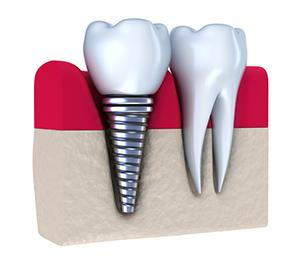Are you ready to replace a missing tooth but aren't sure if dental implants will work for you? Anderson, SC, dentist Dr. Mark Hoyle  discusses the implant dentistry process and discusses that factors that will affect your ability to receive an implant.
discusses the implant dentistry process and discusses that factors that will affect your ability to receive an implant.
What happens when I receive an implant?
A dental implant is a synthetic replacement for a natural tooth root. The implant itself is hidden under your gums and securely anchors a dental crown that will be visible above your gums. The first step in the implant process involves making a small hole in your jawbone. Once the titanium implant is placed in the opening, it starts to osseointegrate, or bond, to your jawbone. Full bonding generally takes about three to six months. After the implant has osseointegrated, you'll receive the crown that will fill the gap in your smile.
Depending on the extent of your tooth loss, you can replace a single tooth or multiple teeth with dental implants. If you've lost all of the teeth in your upper, lower or both jaws, you may want to consider implant-supported dentures.
Is a dental implant a good choice for me?
Dental implants offer a long-lasting way to replace missing teeth for many Anderson residents. As long as you're in good oral and general health, you can probably benefit from an implant. The following issues can have a negative impact on dental implants, although they won't necessarily prevent you from eventually receiving an implant:
- Gum Disease: Your gums will help support your new tooth. Dental implants are possible if you've had gum disease, but your gums must be completely healed before you begin the implant dentistry process.
- Diabetes or Immune System Diseases: Poorly controlled diabetes and immune system diseases and disorders may interfere with the healing process.
- Shallow Jawbone Depth: Implants won't be successful if your jawbone isn't deep enough to support them. If jawbone depth is a problem, bone grafts may be recommended prior to receiving an implant.
- Grinding: Your implant may become loose if you grind your teeth while you sleep. A custom-made nightguard will not only protect your dental implant but also reduce the risk that your teeth and restorations will crack due to your habit.
- Poor Oral Hygiene Habits: Failing to brush and floss your implant daily can increase your risk of developing gum disease or periodontitis, an infection that can loosen your implant.
- Smoking: Smoking tobacco products can prevent your dental implant from bonding to your jawbone.
Are you interested in dental implants? Call Anderson, SC, dentist Dr. Mark Hoyle at (864) 224-4552 to schedule an appointment.